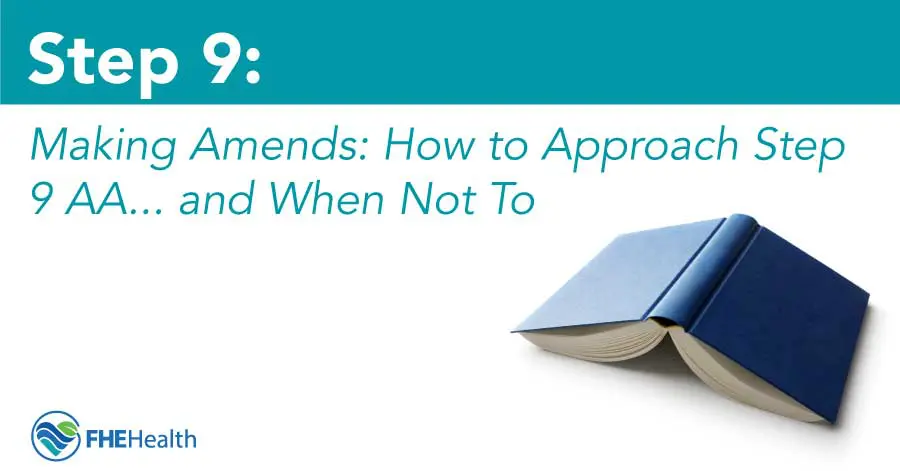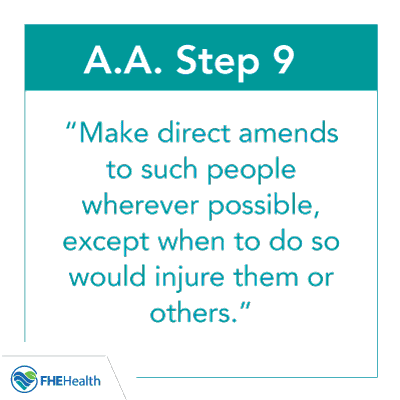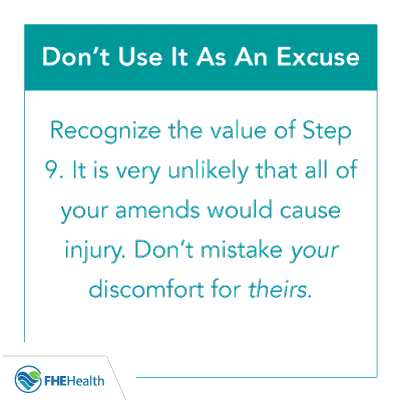
A 12-step program fosters long-term recovery through spirituality, growth, and accountability. Each step presents challenges that encourage change in mindset and behavior. Mutual Aid, peer led support groups like Alcoholics Anonymous guide members to work through these steps to maintain sobriety and help others.
Step 9, often seen as one of the most challenging, requires courage, humility, and guidance. More than an apology, it’s about making genuine amends—taking action to correct past mistakes without causing harm. Here, we explore Step 9, its goals, possible outcomes, and effective language for making amends.
What Is Step 9?
 According to AA.org, Step 9 is to “Make direct amends to such people wherever possible, except when to do so would injure them or others.” This step can be especially hard for those dealing with feelings of shame, pride, or entitlement. However, completing it often brings immense relief and renewed hope. Step 9 is about restoring peace through self-forgiveness, forgiving others, and making amends, which is essential to recovery.
According to AA.org, Step 9 is to “Make direct amends to such people wherever possible, except when to do so would injure them or others.” This step can be especially hard for those dealing with feelings of shame, pride, or entitlement. However, completing it often brings immense relief and renewed hope. Step 9 is about restoring peace through self-forgiveness, forgiving others, and making amends, which is essential to recovery.
Supporting Continuous Recovery
In Step 9, participants acknowledge the negative impact their addiction had on others and commit to direct amends where possible. True amends go beyond apologies; they involve sustained change. These actions demonstrate a new way of living and help develop accountability, paving the way for Step 10, where amends are made immediately upon realizing harm.
Making amends can also reduce stress, by addressing past wrongs may prevent future conflicts that could jeopardize sobriety.
How to Start Step 9
Before Step 9, one completes the Step 8 inventory, listing people they’ve harmed and developing a willingness to make amends. Some people on this list may be harder to approach, so readiness is key. If willingness isn’t there yet, the program encourages asking a Higher Power for guidance until that willingness arises. One can start with those amends that may be easier and work their way up to the more challenging ones.
Goals of Making Amends
According to The Big Book, the purpose of amends is to admit, take accountability for and address the harm caused. This may involve apologizing and, when necessary, making restitution to a person, or organization.
Direct, face-to-face amends are encouraged to facilitate genuine healing. For example, if you once stole from a coworker, you could apologize and offer repayment. This step seeks inner peace and rebirth through the act of making things right, but only when it won’t harm others in the process.
Types of Amends
- Direct Amends: Apologizing and correcting a wrong directly with the person harmed.
- Indirect Amends: When direct contact isn’t possible or would be harmful, one may give back through charity or volunteer work.
- Living Amends: Demonstrating a lifestyle change by actively improving relationships and making positive contributions to others and the community.
Effective Language for Making Amends
An amends letter or script can be a useful way to prepare for a conversation. Here are some guidelines:
- Be Specific: Avoid blanket apologies like, “I’m sorry for everything.” Instead, focus on specific instances of harm.
- Take Responsibility: Share actions you’re taking to address the harm caused.
- Avoid Excuses: If someone is open to amends, they will listen and work with you to rebuild the relationship.
- Avoid language that justifies: “But, if only, because you….” Even if the recipient of an amends has had problematic behaviors, this is not the time to point them out. Focus solely on the harm you caused and do not justify your wrongs by pointing out theirs.
When Not to Make Amends
 There are times when making amends could cause harm. Situations to avoid include cases where:
There are times when making amends could cause harm. Situations to avoid include cases where:
- The person was traumatized by your actions.
- Making an amend could put you in danger of use or harm.
- The individual explicitly requests no contact.
- Making amends would reopen painful wounds, such as a betrayal that ended a marriage.
In these cases, reflect on whether reaching out is to clear your own conscience at the other person’s expense. This is where a 12-Step “sponsor” or even a counselor’s feedback could be helpful in checking your motivation. Sometimes stepping back is the best way you can make amends. Giving a person space and honoring their right to feel what they feel about the impact your addiction and the connected behaviors has had on their lives.
Be Mindful of Motives and Boundaries
It is very important to recognize that the act of making amends is for you and not the other person. You are setting the record strait to clean up your side of the street, so to speak. However, some may be tempted to take this step too quickly with the primary goal of making themselves feel better fast, avoiding uncomfortable feelings that come up when examining negative behaviors.
What happens when an attempt to correct your wrongs may cause further harm? For instance, substance use impacts a parent’s relationships with their children, but making amends to them should never be in a language or explanation which is beyond their comprehension. They don’t need details about your use, where and when. Too much information (TMI) can cause further harm. In fact, for children, being present, acting differently and sticking with commitments are powerful ways to make amends.” Making amends is not an opportunity to “trauma dump” on the recipient, in fact it should be an exercise in humility and restraint, focusing on the changes you need to make and how you have and will sustain change.
Step 9 is All About Action
Sometimes starting with the easiest and moving towards the most uncomfortable amends is a good way to proceed. Meeting in person is ideal but some recipients may not want to do that. A letter is a good way to bridge a connection. Here is one example of a Step 9 script or written template for making amends to someone that avoids justifying or defending prior behaviors:
An Example Step 9 Letter:
Dear
As a part of my recovery process, I have reflected on my behavior and realized that I have hurt you in the past though my___________. (Be specific in your description of behaviors such as dishonesty or irresponsibility but avoid getting bogged down by specific instances.) I am reaching out today to express that I am truly sorry for the hurt I have caused, and I am taking accountability for my behavior. I do not expect anything in return and sincerely appreciate you taking the time to (read or listen) to me.
Today I am working on (the behaviors noted above) by ___________________. I recognize that you may not trust my intentions or my ability to change today and I do not blame you, but my hope is that over time the changes in my behavior will demonstrate my commitment to recovery. If there’s anything I can do today to make things right, please let me know. My only goal right now is to acknowledge the harm I caused and do what I can to make amends, if that’s possible.
Thank you again for taking the time to listen (or read this) and please reach out if you have any questions or feedback in the future.
Leave out the “but” and listen
When making amends it is important that you focus on your behaviors only and your amends. “If you would have only…. or because of my drug use I ….” have no place in this process. Of course, others in our lives had negative behaviors or unhealthy ways of responding to addiction but that has nothing to do with us making amends for our own behaviors. We alone are responsible for this. You will lessen the impact of your amends if you water it down with excuses and external blame. It is equally important that you genuinely stop and listen to the other person. Even if you want to justly or correct, allow them the right to express their experiences, feelings and thoughts about the harm. If you have a reaction to their feedback, pause and just listen then share your thoughts about this with your support system, therapist or sponsor.
Managing Expectations
While making amends can be healing, the outcome is not always predictable. Some people may refuse to listen or accept apologies. Even if you have changed, no one owes you forgiveness. How they heal is entirely up to them. Nonetheless, being accountable for your misdeeds is your goal. Your actions alone may bring you a sense of peace, whether a person accepts you amends or not. Working through Step 9 allows you to move forward, regardless of how others respond.
How Amends Benefits Both You and Others
Making amends fosters clarity, self-forgiveness, and relief from guilt, which is healing. It also offers others a chance to gain resolution or a deeper understanding of your recovery journey. Repairing previous harm also assists in helping you rebuild important relationships which may have been impacted by addiction.
Those who receive an amends see firsthand that people with use disorders can and do recover, becoming healthy, happy and productive community members. They see that there is hope.
Step 9 also allows one to practice the processes of self-reflection, accountability and making amends, all key components the next step, Step 10. “Continued to take personal inventory and when we were wrong promptly admitted it.” As a person practices amends, they become increasingly comfortable with promptly addressing mistakes as they occur, rather than avoiding them. By proactively and “promptly” admitting wrongs, those in recovery may be able to prevent future conflicts that could trigger a lapse in unhealthy behaviors or a return to use.
Taking the Next Steps toward Wellness
One very effective way to make amends is to go to Treatment. Through guidance, education and therapy, FHE Health can help a person begin to rebuild their relationships with self and others. Our team will work closely with you throughout this process to help you achieve your goals in recovery.
Making amends is a powerful step toward lasting peace. By confronting past mistakes, you begin to put the past behind and embrace a brighter, healthier future.
Our 12-Step Series:
- Why the 12-step Program Still Works
- Step 1: Why the 12-step Journey Begins with Powerlessness
- Step 2: What is a Higher Power?
- Step 3: God as you Understand Him
- Step 4: Your Moral Inventory
- Step 5: Admitting Your Wrongs
- Step 6: Addressing Character Defects
- Step 7: Removing our Defects
- Step 8: Willing to Make Amends
- Step 9: Making Amends, How to Approach Step 9
- Step 10: Ongoing Inventory
- Step 11: How to Deepen Your Connection with a Higher Power
- Step 12: Sharing Your Spiritual Awakening With Others
- Understanding AA Lingo
- The Principles of AA






